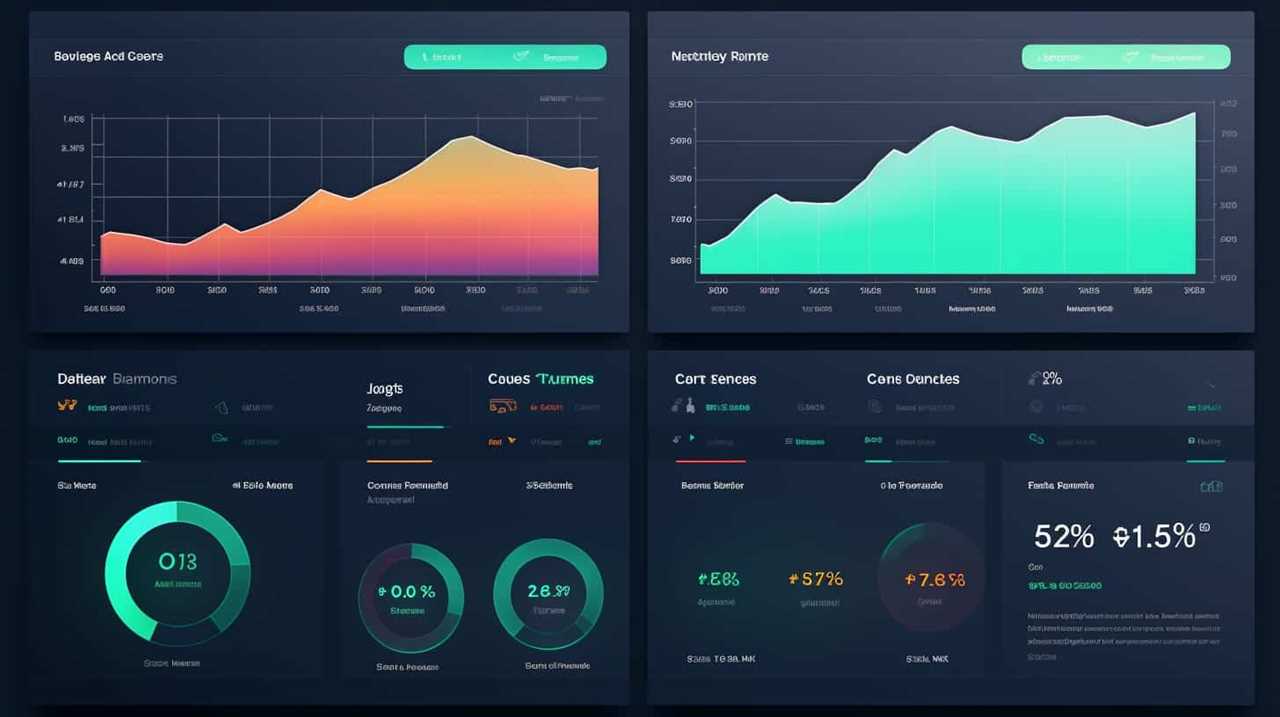Are keywords crucial for SEO?
We’re here to shed light on this crucial question. In the ever-changing landscape of search engine optimization, understanding the role of keywords is paramount. Search engines have become adept at prioritizing user intent and quality content, leading to a shift in our approach to keywords.
But make no mistake, keywords still hold great significance in achieving SEO success. Join us as we explore effective utilization, strategies for research and optimization, and what the future holds for keywords in SEO.
Key Takeaways
- Rise of voice search has increased the importance of keyword optimization.
- Keywords are crucial for online marketing success.
- Understanding and catering to user intent while delivering quality content is crucial for SEO success.
- Long-tail keywords and natural language queries will become more important due to voice search.
The Evolving Role of Keywords in SEO
Keywords have undergone significant changes in their role within SEO. With the rise of voice search, keyword optimization has taken on a new level of importance. Voice search has revolutionized the way people search for information, and as a result, keyword targeting has had to adapt.

Instead of focusing solely on written keywords, SEO professionals now need to consider the impact of voice search and optimize for conversational phrases and long-tail keywords. Additionally, the role of semantic search in keyword targeting can’t be ignored. Search engines are becoming more sophisticated in understanding the context and intent behind search queries, and semantic search helps to connect relevant keywords and concepts.
As we delve deeper into the evolving role of keywords in SEO, it becomes clear that search engines value user intent and quality content.
How Search Engines Value User Intent and Quality Content
One of the key factors that search engines prioritize when evaluating websites for SEO is the alignment between user intent and the provision of high-quality content.
User intent optimization refers to the practice of tailoring website content to meet the needs and expectations of users. Search engines have become increasingly sophisticated in understanding user intent and have shifted their focus from simply matching keywords to delivering the most relevant and valuable content.

Content quality ranking plays a vital role in this process. Search engines assess the quality of content based on factors such as relevance, credibility, and usefulness to users.
Websites that consistently provide high-quality content that aligns with user intent are more likely to rank higher in search engine results, leading to increased visibility and organic traffic.
Therefore, understanding and catering to user intent while delivering quality content is crucial for SEO success.
The Shift in Approach to Keywords in the Modern Era
In the modern era, our approach to keywords has undergone a significant shift. With the evolution of keyword strategies and the impact of voice search, we now need to consider a broader range of factors when optimizing for SEO.

Traditional keyword research and exact match optimization are no longer sufficient. Instead, we must focus on understanding user intent and providing valuable, relevant content. Voice search has also influenced this shift, as more people use natural language queries when searching. Consequently, our keyword strategies must adapt to accommodate long-tail keywords and conversational phrases.
By aligning our content with user intent and incorporating these new keyword approaches, we can improve our SEO performance and drive organic traffic.
Now, let’s explore the significance of keywords in SEO success.
The Significance of Keywords in SEO Success
As we delve into the significance of keywords in SEO success, it becomes apparent that understanding user intent and providing valuable, relevant content is paramount.

To fully grasp the importance of keywords, consider the following:
- Keyword analysis techniques: Conduct thorough research to identify the most relevant and high-performing keywords in your industry. This involves analyzing search volume, competition, and user behavior to optimize your content effectively.
- Importance of keyword placement: Strategic placement of keywords throughout your website and content is crucial. This includes incorporating keywords in title tags, meta descriptions, headings, and within the body of your content to signal relevance to search engines.
- User-focused content: Keywords are meaningless without valuable content that fulfills user intent. Ensure your content is informative, engaging, and meets the needs of your target audience.
Effective Utilization of Keywords in Online Marketing
Why are keywords crucial for our online marketing success?
Effective keyword research and keyword optimization strategies play a vital role in maximizing our online marketing efforts.
By conducting effective keyword research, we can identify the specific words and phrases that our target audience is using to search for products or services.

This allows us to optimize our website content, meta tags, and other elements to align with those keywords, making it easier for search engines to understand and rank our website.
Additionally, using the right keywords in our online advertising campaigns can help us reach our target audience more effectively.
By utilizing these strategies, we can improve our visibility, drive more organic traffic, and increase conversions.
In the next section, we’ll discuss strategies for keyword research and optimization, which will further enhance our online marketing success.

Strategies for Keyword Research and Optimization
When it comes to keyword research and optimization, there are several strategies that can help improve SEO.
Targeting long-tail keywords is one effective approach, as they’re more specific and have less competition.
Analyzing competitor keywords can also provide valuable insights and help identify new keyword opportunities.
Targeting Long-Tail Keywords
In our pursuit of effective SEO strategies, we’ve found that targeting long-tail keywords through thorough research and optimization is essential. Long tail keyword research allows us to identify specific, niche phrases that potential customers are searching for. By incorporating these long-tail keywords into our website content, we can increase our visibility in search engine results and attract highly relevant traffic.

The SEO benefits of targeting long-tail keywords are numerous:
- Higher conversion rates: Long-tail keywords typically have lower search volume but higher intent, meaning that users who search for these specific phrases are more likely to convert into customers.
- Lower competition: Long-tail keywords often have less competition, making it easier for our website to rank higher in search results.
- Improved user experience: By targeting long-tail keywords, we can create content that directly addresses the needs and interests of our target audience, providing them with a better user experience.
Competitor Keyword Analysis
How can we effectively conduct competitor keyword analysis for SEO?
Competitor analysis is a crucial step in keyword research and optimization. By analyzing our competitors’ keywords, we can gain valuable insights into what’s working well for them and identify opportunities for our own SEO strategy.
To start, we can use tools like Google Keyword Planner or SEMrush to identify the keywords our competitors are targeting. We can also analyze their website content, meta tags, and headings to see which keywords they’re prioritizing. Additionally, we can look at their backlink profiles to understand the keywords they’re using in anchor text.

Competitor keyword analysis allows us to uncover new keyword ideas, understand the competitive landscape, and refine our SEO strategy accordingly. By learning from our competitors’ successes and failures, we can optimize our website to rank higher in search engine results pages.
Now, let’s move on to the next section where we’ll discuss optimizing keyword density.
Optimizing Keyword Density
To optimize keyword density, we employ effective strategies for keyword research and optimization. When it comes to optimizing keyword placement and achieving the right keyword density, there are several important factors to consider:
- Conduct thorough keyword research: This involves identifying relevant keywords and phrases that align with your target audience and search intent.
- Analyze keyword density: It’s crucial to strike the right balance between using keywords enough to signal relevance to search engines, but not overusing them to the point of keyword stuffing.
- Incorporate keywords naturally: Place keywords strategically throughout your content, including in headings, subheadings, and meta tags, while ensuring they flow naturally within the context.
By following these strategies, you can optimize keyword density and improve your SEO performance.

Now, let’s explore the future of keywords in SEO and what we can expect.
The Future of Keywords in SEO: What to Expect
As we look ahead to the future of SEO, it becomes clear that keyword relevance will continue to play a vital role in driving organic traffic to websites. However, with the rise of voice search, we can anticipate a shift in the way keywords are used.
The impact of voice search on SEO means that long-tail keywords and natural language queries will become more important than ever. Additionally, the evolution of semantic search will require a deeper understanding of user intent and context, prompting the need for more sophisticated keyword strategies.
Keyword Relevance in SEO
What impact will the future of keywords have on SEO? As we delve into the topic of keyword relevance in SEO, it’s crucial to understand the evolving landscape of keyword research and optimization. Here are three key points to consider:

- Semantic search: Search engines are becoming smarter in understanding user intent and context. This means that optimizing for long-tail keywords and creating content that matches user queries will be more important than ever.
- User experience: The future of SEO lies in providing a seamless user experience. Keywords should be used naturally within high-quality, valuable content to engage and satisfy users.
- Voice search optimization: With the rise of voice assistants, optimizing for voice search queries will be essential. This includes using conversational language and targeting long-tail, question-based keywords.
Understanding these trends in keyword relevance will help us seamlessly transition into discussing the impact of voice search on SEO.
Voice Search Impact
Exploring the future of keywords in SEO, we’ll examine the impact of voice search.
Voice search optimization is becoming increasingly important as the impact of voice recognition technology continues to grow. With the rise of virtual assistants like Siri, Alexa, and Google Assistant, more and more people are using voice commands to search for information online.
This shift in search behavior has significant implications for SEO strategies. For instance, voice searches tend to be longer and more conversational compared to typed searches. As a result, optimizing content for long-tail keywords and natural language becomes crucial.

Additionally, voice search often provides a single answer rather than a list of results, making it essential to aim for featured snippets and position zero rankings.
To stay ahead in the ever-evolving world of SEO, businesses need to embrace voice search optimization and adapt their strategies accordingly.
Semantic Search Evolution
Moving forward in our exploration of the future of keywords in SEO, let’s delve into the evolution of semantic search. Semantic search algorithms and natural language processing are revolutionizing the way search engines understand and interpret user queries.
Here are three key aspects to consider:

- Contextual understanding: Semantic search algorithms analyze the context and intent behind search queries, enabling search engines to provide more relevant results.
- Entity recognition: With the advancement in natural language processing, search engines can identify entities within a search query, such as people, places, or organizations, leading to more accurate results.
- Semantic markup: Implementing structured data and semantic markup on web pages helps search engines better understand the content and context, improving visibility in search results.
As semantic search continues to evolve, the focus will shift towards understanding user intent and delivering personalized search experiences. Mastering semantic search algorithms and leveraging natural language processing techniques will be crucial for achieving SEO success in the future.
Frequently Asked Questions
How Can I Determine the Right Keywords to Target for My Website?
Determining the right keywords for your website is crucial for SEO success. To do this, we utilize keyword research tools and analyze competitor keywords.
By conducting thorough research, we can identify the most relevant and high-performing keywords in your niche. This allows us to optimize your website’s content and meta tags, improving your visibility in search engine results.
Targeting the right keywords ensures that your website attracts the right audience and drives organic traffic.

Are Long-Tail Keywords More Effective Than Short-Tail Keywords for Seo?
Long tail vs short tail keywords: Which drives more organic traffic?
The impact of keyword research on SEO success is a topic of great importance. When it comes to the effectiveness of long-tail keywords versus short-tail keywords for SEO, it’s crucial to understand their impact on driving organic traffic.
Long-tail keywords, with their specificity and relevance, tend to attract more targeted and qualified visitors to your website.
However, short-tail keywords can still play a significant role in boosting your overall visibility and attracting a broader audience.

Can I Still Rank Well in Search Engines Without Using Keywords?
Yes, user experience and website design can greatly improve search engine rankings.
While keywords are important for SEO, there are alternative strategies that can be effective. By focusing on providing valuable content, optimizing website speed, and improving navigation, search engines will recognize the quality of your site.
Additionally, incorporating relevant meta tags and optimizing images can also boost your rankings.
Should I Focus on Optimizing My Website for One Main Keyword or Multiple Keywords?
When it comes to optimizing our website, we’ve to decide whether to focus on one main keyword or multiple keywords.

It’s essential to consider our target audience and the goals of our website.
By targeting one main keyword, we can create a more focused and cohesive SEO strategy.
However, targeting multiple keywords can help us reach a broader audience and increase our chances of ranking for various search queries.
Ultimately, it depends on our specific goals and how we can effectively target keywords for our website.

Are There Any Alternative Strategies to Improve SEO if Keywords Are Becoming Less Important?
When it comes to improving SEO, we need to consider alternative strategies. While keywords have been important in the past, their significance is diminishing.
Instead, we should focus on the importance of user experience. By creating a website that’s easy to navigate, loads quickly, and provides valuable content, we can enhance our SEO efforts.
This shift in strategy allows us to cater to the needs and preferences of our audience, ultimately boosting our search engine rankings.
Conclusion
In the ever-evolving world of SEO, keywords remain a crucial element for success. They serve as the bridge between users and search engines, helping to deliver relevant and valuable content.

Just as keywords hold immense power in driving online marketing strategies, they also symbolize the connection between businesses and their target audience. By carefully researching and optimizing keywords, businesses can unlock the potential for higher rankings and increased visibility.
As we look to the future, the significance of keywords in SEO will only continue to grow.









